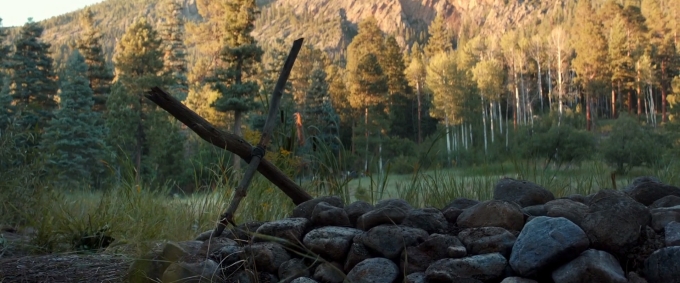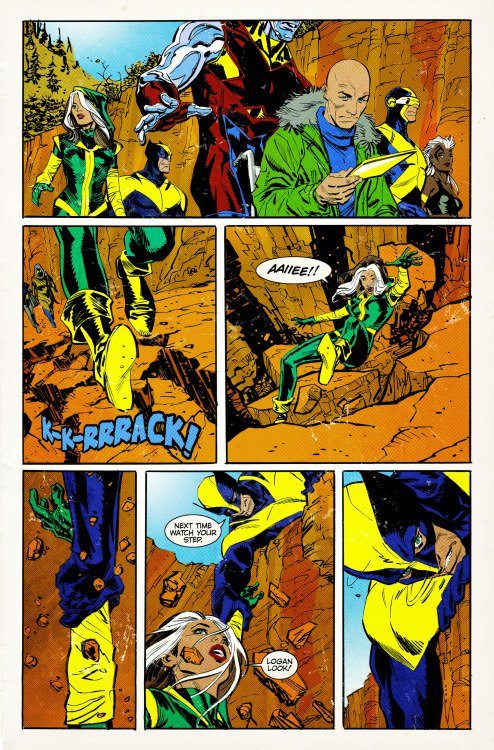On Mangold and Stevens’ icons and the imitations.
[WARNING: THIS PIECE CONTAINS SPOILERS FOR BOTH LOGAN AND SHANE. SEEING BOTH BEFORE READING IS IDEAL, BUT ONLY LOGAN IS NECESSARY]
I keep going back to Shane.
Not unwarranted by any means, instead it’s hard not to considering the way that James Mangold utilises segments of the 1953 film within his own during the casino interlude, but Logan walks the path of George Stevens’ Western in more ways than just this. This is most relevant in discussing the farmhouse sequence in which the trio of Logan (Hugh Jackman), Charles Xavier (Patrick Stewart) and Laura Kinney (Dafne Keen) are taken in by the Munson family, its patriarchal figure portrayed by Eriq La Salle, where Logan finds himself on the border of peace and violence. The tectonic plates where shift, sizable or minimal, can cause shake-ups –– the same conundrum that Alan Ladd’s titular character found himself in, in 1953.
Evidently indebted to Stevens’ film, Logan deals with the push and pull of those two states and the battle of the self, although this (presumed) final outing for Jackman’s portrayal also assumes it necessary to demonstrate this with an overt physical battle. Films are by no means required to be subtle –– Darren Aronofsky plays with this same notion in Black Swan, Hell or High Water, an actual Western, utilises its opening shot of a graffitied wall to directly state its theme and The Departed ends with a shot of a rat, that has simultaneously become both joke and verbatim for already obvious symbolism –– and even the genre that Logan most wishes to be taken as, a Western, has never required such a caveat, indicated by not only the aforementioned Hell or High Water, but also in the way that HBO and Jonathan Nolan & Lisa Joy’s Westworld lampoons a staple of the genre, asking participants to decide whether they want to be a black, or white, hat.
While Logan, the character, may not be enamoured by Shane, leaving Charles and Laura to watch, Logan, the film, is clearly so, walking in the footsteps of the Ladd who came before, until the end, in which Mangold makes a key diversion. Logan does not end with its hero walking off into the sunset, as Laura calls his name, neither sure if he will finally fall when he crosses the hill, from a wound inflicted in the final fray. Instead, and if we accept this to truly be Jackman’s last performance as the character, both in the timeline of the X-films and the production of those films, we see Logan die, but also understand that both the young and the old, the peaceful and the violent, the student and the teacher can finally rest.

It’s a resonant idea, the reason that so many have attested to shedding a tear for what many consider one of the consistencies in a franchise which has gone through turbulent times to say the least.
However, I don’t believe that it’s as perfect as it could be and the reason that this feeling refuses to leave my side, is down to the elements existing within the film as is –– this isn’t a call for Cyclops or Nightcrawler to have been involved within a climax, instead the opposite. James Mangold, has proven himself capable of making multiple types of film, two types being: Westerns and proto-Westerns. 3:10 to Yuma falls under the former, Copland and Logan, under the latter. Mangold is clearly both in love with, and indebted to, the Western, from the way he loves to shoot the desolate landscapes in wide shots, to the already mentioned links to Shane, and this is where the issue arises. As much as this film tries, it can’t be Shane. Logan is a film whose cast consists of comic book characters from a pre-existing universe, and as a result of this, compared to a film like Persepolis or the upcoming Atomic Blonde, that link to the genre precludes all other possible classifications.
As a result of that, Logan utilises one of the genre’s frequently used tropes, clones, for both good and bad. The former, X-23/Laura Kinney, is great, more impressive than many breakout child performances because Keen’s initial impression on the audience is conveyed while mute, and after she breaks her silence, she and Logan have a dynamic much like Shane and Joey. The latter, X-24, played by Jackman, is not and his importance to the plot of the film allows us to clearly mark the point where the film drops-off –– when it cuts in order to show his POV from a room in a facility –– and unfortunately, never recovers. Essentially, X-24’s existence makes subtext into text, a narrative decision not required.
The comics that fill this world already go to demonstrate that Logan is feuding with someone who shares his appearance, a former self, one that has also been immortalised, in these works and the minds of children. If you will, these comics have become the dime novels of this world, embellishing events in order to make them more exciting. Eden isn’t real, at least not as the issue presents it. Instead, it becomes a reality, if only for a precious moment, thanks to the children, who saw this adventure in its paneled glory, and were driven to make it true. Logan was already in a battle with himself, attempting to prove that he could be the costumed man in the comics.

I feel that it would have been more appropriate that the allegorical gunslinger, the legend, is in conflict with what became his legend.
My problem with Logan isn’t exclusive to this film as I feel similarly about The Wolverine and the inclusion of the Silver Samurai. Much like then, I wish that Mangold had been able to go all the way with regards to their respective inspirations, but it feels like a bigger flaw here, because not only does Logan have less faults overall, but it’s also closer to true greatness. As mentioned, Mangold has shown himself capable of making both Westerns and proto-Westerns. In its decided permutation, Logan would like to be Shane, but it can’t because of its comic book links. Simultaneously, I don’t think that Logan can be the best comic book film because it is those tenuous tropes, those links to the genre that hold it back.
I keep going back Shane because it told the story Logan was almost able to tell and because clones never have the essence of the original.

